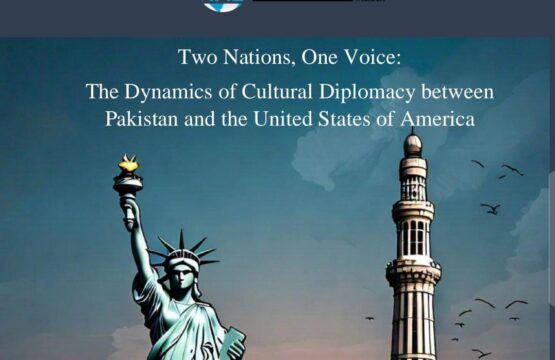The dawn of the 21st century embarks on a new era of technological advancements. It has seen an unparalleled upsurge in technological developments, causing a paradigm shift in a variety of fields. Among these horizons are the immensely renowned cyber security and artificial intelligence.
The path to dominance in the world might change for states depending on how well they manage the development of artificial intelligence (AI). Whether AI poses an existential threat to humans or not, governments need to develop innovative regulatory frameworks to identify, evaluate, and deal with the various issues brought on by AI developments.
The advent of artificial intelligence in the realm of international relations has been quite sudden. Most abruptly, states are finding themselves in a babble with huge bombardments of information and technological advancement, and they need help to chalk out preventive measures and put them into practice.
The character of these advancements in shaping geopolitics has two fronts: technological race and potential threat. On the former front, states can be seen in a continuous race to take over others in terms of advanced technology, such as the use of AI and cyber-security.
However, on the latter front, we analyze the same states in a constant dilemma of safeguarding itself against these potential threats. Now, the query to be pondered here is how states will achieve the equilibrium between productive and coercive use of these tools.
States today compete with one another for technological superiority because they comprehend that mastering these developments supports economic expansion, security, and geopolitical aptitudes.
The relationship between technological advancement and geopolitical position has evolved into an intricate maneuver in this century, determining the boundaries of power and influence in the modern world. With the potential to revolutionize everything from healthcare to transportation, artificial intelligence (AI) innovation is spreading across the globe at a rate never seen before.
Nevertheless, a critical question still needs to be answered: how does AI impact the intricate web of geopolitics despite all of this amazing progress? The combination of AI technologies and cyber-security regulations is bringing about this new era of possibility and danger, where nations struggle for dominance in the digital world amid continuously shifting risks and weaknesses.
By analyzing vast volumes of data to foresee and stop attacks, artificial intelligence (AI) transforms national security strategies from reactive to preventative, enabling readiness.
The productiveness of advanced AI nations is rising in a variety of industries, including finance and healthcare. For example, Singapore has deliberately positioned itself as a center for AI research and development, creating an environment that draws top talent from around the world and promotes economic growth.
This technological superiority not only makes a country more competitive but also opens doors for cooperation as nations look to capitalize on one another’s advantages in the pursuit of common economic objectives. AI’s integration with cybercrime has completely changed defense and national security powers.
Also Read: Global Crisis, Shared Responsibility of Climate Change
Today, countries can strengthen vital infrastructure, improve defenses against cyber-attacks, and react quickly to such threats. Israel, which is well-known for its proficiency in cyber-security, is a prime example of this shift. Israel has greatly improved its capacity to stop cyber-attacks by utilizing AI-driven technology. This has benefited both its national security and the cooperation of its allies in the field of cyber defense.
A new age of economic expansion and technical innovation is signaled by the integration of AI and cyber-security into international relations (IR). A revolution in the field of international relations has been brought about by the introduction of artificial intelligence (AI) and cyber-security.
Nations may now anticipate and avert disputes thanks to advanced analytics and AI-driven technologies, encouraging a more proactive approach to international relations. This development in diplomacy is exemplified by the European Union’s use of AI to examine global trends and evaluate potential hazards.
This evolution is marked by the proliferation of cyber espionage, state-sponsored cyber-attacks, and the development of autonomous weapons systems imbued with AI capabilities.
The traditional notions of sovereignty and security have been redefined in the context of borderless cyber threats, necessitating a re-evaluation of conventional diplomatic frameworks. Moreover, the rise of AI-enabled disinformation campaigns and influence operations has blurred the lines between domestic and international politics, amplifying the significance of information warfare in shaping global narratives.
In an effort to tackle common threats and reduce vulnerabilities in the digital sphere, countries are building cyber defense partnerships and strategic alliances at a faster pace. Virtual networks have replaced physical boundaries as the primary means of power projection, with states using AI to improve their capacity for information gathering, surveillance, and offensive cyber operations.
The strategic rivalry between the US and China serves as an example of how international relations have changed since the advent of cyber-security and artificial intelligence. Both countries have made significant investments in AI research and development; China’s Made in China 2025 project, for example, aims to exceed the US in key AI capabilities and achieve technological self-sufficiency.
States are spending extensively on defensive cyber-security measures to defend key infrastructure against possible threats, making the digital sphere a battleground for both collaboration and competition. Concurrently, reservations regarding AI turning into a weapon surface are calling for the creation of global regulatory frameworks and moral standards to control its application.
The possibility of technical asymmetry, in which countries with highly developed AI capabilities hold overpowering influence and may create a new kind of geopolitical inequity, is one significant problem. China, for example, is a prime example of the possible power imbalances that might result from technological superiority.
China has made strategic investments in AI, including the creation of advanced surveillance systemization of AI, calling for the creation of global regulatory frameworks and moral standards to control its application.
The porous boundaries between attack and defense in the field of cyber-security present another difficulty. In international relations, the employment of AI-driven offensive cyber technologies presents serious ethical and strategic challenges, as demonstrated by the malware STUXNET, which was designed to strike Iran’s nuclear facilities.
Moreover, the increased susceptibility of vital infrastructure to cyber-attacks adds a new level of concern to national security, calling for international cooperation to put strong defenses in place. Furthermore, the possibility of a worldwide regulating vacuum is increased by the absence of uniform international laws regulating cyber-security and artificial intelligence.
In the absence of defined norms, there is discretion for unilateral measures and the possibility of international confrontation, which is reminiscent of the difficulties encountered in the early stages of nuclear dissemination.
As artificial intelligence (AI) systems become ingrained in military strategy, ethical quandaries also come to the fore on a global scale. The possibility of unforeseen repercussions and the breach of established standards in armed confrontations are issues raised by the development of autonomous weapons, which are able to make judgments without human interference.
It is now a difficult diplomatic task to strike an equilibrium between using AI for national security and upholding moral principles. A number of new issues are raised by the integration of cyber-security and artificial intelligence into international relations, which need careful analysis and cooperative solutions.
These complexities range from the potential for increased technological inequality to the moral problems surrounding AI in warfare and the lack of strong international regulations. The ever-changing field of international affairs requires the diplomatic and strategic landscape to evolve to meet the complex problems presented by the convergence of cyber-security and artificial intelligence (AI).
In conclusion, the nexus of cybersecurity, artificial intelligence (AI), and geopolitics offers a dynamic environment full of previously unheard-of potential and challenges. Cybersecurity is emerging as a frontline defense as governments compete for technical dominance, and the rush to harness AI’s potential deepens geopolitical tensions.
The international community must navigate the fine line between innovation and protecting against nefarious usage as it addresses the ethical implications of AI deployment.
The symbiotic relationship between AI and cyber-security underscores the importance of fostering innovation while ensuring resilience against emerging threats. By embracing collaboration, transparency, and responsible governance frameworks, stakeholders can harness the transformative potential of AI to safeguard critical infrastructures and promote global stability.
As we navigate this pivotal moment in history, proactive engagement and strategic foresight will be essential in shaping a future where technology serves as a force for progress and prosperity for all. Still, it is to be kept in mind that the rapid growth in AI is visible, but the practical measures for its productive use only are far behind.

International Relations student with solid academic basis in Diplomatic Relations, International Law and Intercultural Communication. Her writings focus on international relations, feminism and current trends.







